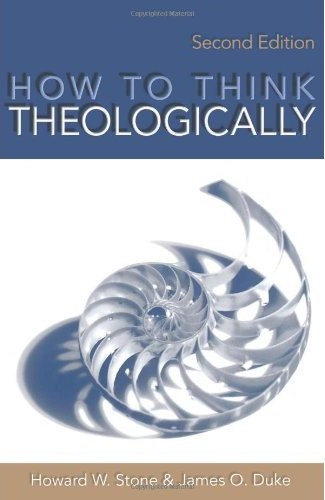 Howard W. Stone & James O. Duke, How to Think Theologically
Howard W. Stone & James O. Duke, How to Think Theologically
(Second Edition; Minneapolis: Fortress, 2006).
I picked this book up at the book table during our recent ANZATS Conference. The next day they replaced it with a third edition copy – D’Oh!
Stone & Duke have written their smallish, easy-to-read book with students and interested lay people in mind. Their basic premise is that all Christians are theologians simply because they are Christian. Their passion, however, is that Christians approach all of life with a theological frame of mind; that they learn to live in the everyday rough-and-tumble world informed by and responsive to a developed theological framework which helps them in their decision-making and action. In a word, their desire is to nurture informed Christian life rather than supply an academic method for “getting the right answer.”
The book is divided into three sections with chapters 1-4 laying the foundation for theological reflection. The chapters explore what theology is and how it is approached, adopting the ancient characterisation of theology as “faith seeking understanding.” The authors rightly insist that theology is a human activity, a response to God grounded in faith. Theology is personal but not private. It is an interactive practice, dialogical, corporate and communal, grounded and occurring in the Christian community. These chapters address the distinction between “embedded” or implicit and possibly pre-reflective theology, and “deliberative” theology, which is an explicitly chosen and committed theology, based in critical reflection on one’s beliefs and practices.
Stone & Duke use the metaphor of a craft to describe theology. Theology is something learned and developed through practice and growth in skill. The task of theology is to interpret all of life through a lens of faith, bringing all the various features, facts and experiences of life into explicit relation to Christian theological categories and truth claims. But even this lens, and these categories need to be assessed, and Stone & Duke provide four tests for assessing our theological perspectives:
- Is it “Christian” – i.e., conformed to the gospel?
- Is it intelligible, and plausibly coherent?
- Does it have moral integrity?
- Is it valid – i.e., true to life, Scripture, and actually true?
 The authors identify the so-called Wesleyan Quadrilateral—Scripture, tradition, reason and experience—as the resources (rather than “sources”) required for theological reflection. Of these, Scripture is primary, but reason is the most active, at work in our interpretation of Scripture, in the exploration and evaluation of tradition and experience, and in the work of building connections between theology and all the other disciplines of academic inquiry.
The authors identify the so-called Wesleyan Quadrilateral—Scripture, tradition, reason and experience—as the resources (rather than “sources”) required for theological reflection. Of these, Scripture is primary, but reason is the most active, at work in our interpretation of Scripture, in the exploration and evaluation of tradition and experience, and in the work of building connections between theology and all the other disciplines of academic inquiry.
Chapters 5-7 form the heart of the book, and provide the three categories of thought that are to guide life-related theological reflection. The first category is the gospel which more than anything else, is the story of the love of God revealed Jesus’ life and ministry, death and resurrection, and the meaning of this story as it is unpacked in the writings of Scripture. Theological reflection involves bringing all of life into explicit correlation with the major features of this story including what it means to embody this story in the world, and how this gospel is communicated and its benefits received by people through faith.
The second category concerns the human condition, by which Stone & Duke mean the reality of sin as the basic problem of human existence, and how that problem finds resolution through the provision of salvation and the means of grace. The authors insist that without clear thought around these matters, we will fail to address the issues of real-life at the level required to see God’s transformative work. The final category of thought required for fruitful theological reflection is vocation which addresses the inescapable question: “What must we do? How are Christians called upon to act?” (100). In many situations a variety of responses and actions are possible, so Stone & Duke provide guidance for choosing the most fitting response, which include assessing the real reasons for why we typically act as we do, identifying distinctly Christian reasons to guide our response. The point is “to choose one particular view or action that is the most fitting expression of Christian faithfulness in a given situation” (107).
It is worth noting that Stone & Duke do not prescribe the particular way in which these critical categories of thought must be believed. In fact, just the opposite. They insist that there are varieties of ways in which issues of gospel, sin and salvation, and vocation have and are understood in the Christian tradition, and that deliberative theological reflection will be open to explore, question and evaluate each of them. Their intent is to help communities of believers come to grips with the content and meaning of these doctrines within their own traditions and situations.
The final section of the book (chapters 8-9) detail some of the practices involved in critical theological reflection and the spiritual disciplines which support it. These chapters locate the practice of theological reflection in the community of faith, and insist that theological reflection be aligned with spiritual formation. Participation in Christian community and practices of spiritual formation help serve to keep theological reflection from becoming merely an individual and purely cognitive exercise in which the believer’s faith becomes privatised and intellectual rather than spiritual. For these authors, “spiritual formation is a bridge between theological reflection and day-to-day experience” (127).
We need a theology that prepares us for the difficult business of being Christian in the fray of the real world, undergirds our commitment, and guides our action. … To act in accordance with our Christian commitments, often there will not be the luxury of extended theological consideration. The theological work has to be done in advance—deliberative theological reflection—so that its results can inform our every choice. … [As Christians we] need a foundation of prior deliberative theological reflection to prepare us as best as possible for dozens of daily choices as well as the life-altering decisions we face. … We believe that developing basic clarity on the issues raised by the three diagnostic exercises (gospel, the human condition, and vocation) will stand the Christian in good stead when facing the myriad of difficult situations that every day presents (129-130).
Paul commended the Roman church saying, “I myself am satisfied about you, brothers and sisters, that you yourselves are full of goodness, filled with all knowledge and able to instruct one another” (Romans 15:14). This useful book will help contemporary Christians and churches follow in Rome’s footsteps, providing a means to develop the skills of theological reflection with an eye toward this kind robust discipleship and praxis. The clear framework and practical case studies illuminate how congregations might actually practise theological reflection. Leading congregations in intentional and systematic reflection on the gospel, the human condition, and vocation will help them think Christianly, something urgently needed in a culture in which we are very often more shaped by the culture than we are by Christ.